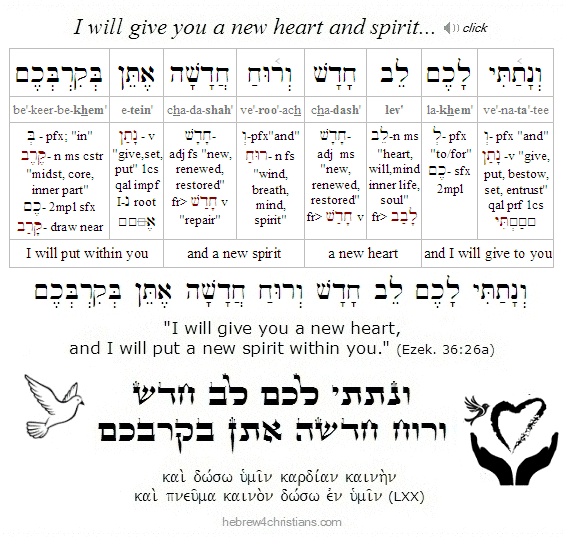|
In his famous "Sermon on the Mount," Yeshua revealed the inner condition of the heart, despite the various pretenses that people may contrive to evade the truth.... "You have heard that it was said, "Do no murder," but I say to you, harbor no anger; you have heard "do no adultery," but I say to you harbor no lust..." You have heard it said, "Do not break an oath," but I say to you swear no oath at all, but let your word be enough. Yeshua brings the Torah inside, to the heart, to reveal our great need. A person who makes an oath assumes he can keep the law, that he can control the impulses and sickness of his own deceptive heart. That is the source of the problem (Jer. 17:9; Eccl. 9:3; Mark 7:21). The Lord reveals what we are inside so that we may realize our need for deliverance from ourselves. What we really need is a miracle on the order of splitting the sea or raising the dead, namely, a new heart (לֵב חָדָשׁ) and a new spirit (רוּחַ חֲדָשָׁה) put within us. For those of you who might struggle with pride, fear, anger, lust, and hardness of heart, please take hold of hope. God can turn "stone to flesh" and make you fully alive by His power.
וְנָתַתִּי לָכֶם לֵב חָדָשׁ
וְרוּחַ חֲדָשָׁה אֶתֵּן בְּקִרְבְּכֶם
וַהֲסִרתִי אֶת־לֵב הָאֶבֶן מִבְּשַׂרְכֶם
וְנָתַתִּי לָכֶם לֵב בָּשָׂר
ve·nah·ta'·tee · lah·khem · lev · chah·dash
ve·roo'·ach · cha·da·shah · e·tein · be·keer·be·khem
va·cha·see·roh·tee · et · lev · ha·e'·ven · mee·be·sar·khem
ve·nah·ta'·tee · lah·khem · lev · bah·sahr

"And I will give you a new heart,
and a new spirit I will put within you.
And I will remove the heart of stone from your flesh
and give you a heart of flesh."
(Ezek. 36:26)

Click to learn the Hebrew text:

The heart (lev) is the inner person, the seat of the emotions, thought, and will. A new heart (lev chadash) represents the transformation of the whole of your inner nature - with the impartation of new appetites, new passions, new desires, etc. (Psalm 51:10). A new spirit (ruach chadashah) implies the renewal of your inner life – the rebirth of your will. This is the "law of the Spirit" (תוֹרַת רוּחַ הַחַיִּים) and the new principle of eternal life (Rom. 8:2).
The "stony heart" (lev ha'even) represents unfeeling, self-serving numbness of being. This heart is the locus of yetzer hara, the inner selfish impulse that is the common heritage of the "natural man." The Targum renders this as, "I will break the heart of the wicked, which is hard as a stone.'' A hard heart has a form of "sclerosis" that makes it closed off and impermeable to love from others, and especially from God. Scripture uses various images to picture this condition, including a "heart of stone" (Ezek. 36:26, Zech. 7:12), an "uncircumcised heart" (Jer. 9:26), a "stiff neck" (Deut. 31:27), and so on. Stubbornness is really a form of idolatry, an exaltation of self-will that refuses to surrender to God.
The heart of flesh (lev basar) represents an inner life of genuine feeling and joy that makes a fit habitation for the radiance of the Divine Presence. After all, the word for "grace" (χάρις) is directly linked to the word for "joy" (χαρά). This heart is soft and tender - a spiritual and sanctified heart - that is submissive to the will of God. It is upon the inner "tablets" of this heart that the Torah of God truly written (Jer. 31:33).
There aren't two gospel messages: one for the sinner and the other for the saint... The message of the gospel is always "good news" to those who are sin-sick and riddled with guilt and shame, and it is always "bad news" for those who deny their inner condition before God and believe that they can justify themselves. In other words, there's no "gospel" message apart from the message of the cross of Yeshua, and the cross represents the end of the ego and its devices. We don't get saved in order to follow the path of self-righteousness; we get saved to be witnesses of God's righteousness... We love God because He first loved us (1 John 4:19).
May it please God to give us all soft hearts and renewed spirits that are empowered to love in the truth and to walk before His Presence... May He perform a divine "heart transplant" so that we may feel the heartbeat of the Spirit within us. Amen.
|




